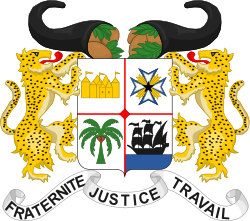| Vice President of Benin | |
|---|---|
| Vice président du Bénin | |
 | |
| Appointer | Direct popular vote (two rounds if necessary) [1] |
| Term length | 5 years |
| Constituting instrument | Constitution of Benin |
| Formation | November 2019 [2] |
| First holder | Sourou-Migan Apithy |
 |
|---|
| |
The vice president of Benin is the second highest political position in Benin. The vice presidency was created by the 2019 amendments made to the Constitution of Benin. [1] [2] The vice president is elected concurrently with the president in direct popular elections.
Contents
The vice presidency was created to ensure succession in case of a vacancy in the presidency. The vice president can have other tasks entrusted to them by the president. [1]




